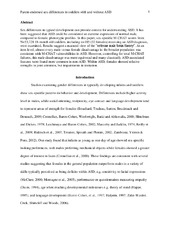Parent-Endorsed Sex Differences in Toddlers with and Without ASD: Utilizing the M-CHAT
Permanent link
https://hdl.handle.net/10037/10109Date
2016-10-18Type
Journal articleTidsskriftartikkel
Peer reviewed
Author
Øien, Roald A; Hart, Logan; Schjølberg, Synnve; Wall, Carla A.; Kim, Elizabeth S.; Nordahl-Hansen, Anders; Eisemann, Martin; Chawarska, Katarzyna; Volkmar, Fred R.; Shic, FrederickAbstract
Sex differences in typical development can provide context for understanding ASD. It has been suggested that ASD could be considered an extreme expression of normal male, compared to female, phenotypic profiles. In this paper, sex-specific M-CHAT scores from N=53,728 18-month old toddlers, including n=185 (32 females) receiving an ASD diagnosis, were examined. Results suggest a nuanced view of the “extreme male brain theory”. At an item level, almost every male versus female disadvantage in the broader population was consistent with M-CHAT vulnerabilities in ASD. However, controlling for total M-CHAT failures, this male disadvantage was more equivocal and many classically ASD-associated features were found more common in non-ASD. Within ASD, females showed relative strengths in joint attention, but impairments in imitation.


 English
English norsk
norsk